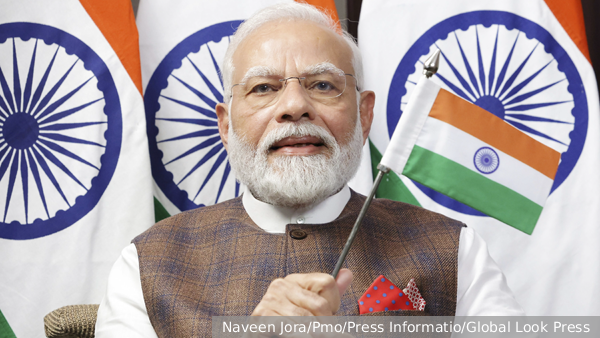
Modi's great balancing act
By Abbas Juma
A politician succeeds when he is able to balance skilfully in a crisis situation, to gain maximum benefit where others are drowning. A successful politician will not stand on the sidelines; he will participate in all important processes, including international conflicts. Keeping as safe a distance as possible.
Of course, the state that a successful politician represents must be independent, well-armed and economically stable. Today, for all its problems, India fits this description better than many other countries. Narendra Modi can therefore rightly be called a successful politician.
Political acrobatics
With close ties to the United States, the Indians have managed not to take sides in the Russia-Ukraine/NATO conflict, have gotten a lot of cheap oil and have not quarrelled with anyone. New Delhi is trying to make the most of the growing competition between the US and China.
After the political split, India has one foot in the US-led QUAD (Quadrilateral Security Dialogue) group, which also includes Japan and Australia, and the other in the BRICS, which is led by China and Russia. Like a skilled juggler, the Indian leader throws several balls in the air without dropping any.
The Indian authorities present work with seemingly incompatible vectors and approaches in a completely harmonious manner. "Vasudhaiva Kutumbakam", which means "one earth, one family, one future". Prime Minister Modi began his article in Rossiyskaya Gazeta for the G20 summit with this formula.
The desire for "one universal family", in which linguistic and ideological barriers are overcome, gives a concrete foundation to India's behaviour in the international arena. And despite the simplicity of Indian formulations, it works.
All partners are important
Despite Western pressure, Russia remains India's main source of cheap oil and relatively cheap but effective weapons. And if the latter raises no questions - India is a traditional client of the Russian military-industrial complex - Russia has filled the oil sector in just one year, displacing Iraq and even Saudi Arabia from this market.
Moreover, payments between countries will continue to be made in national currencies, as the deputy head of the Russian Foreign Ministry, Andrei Rudenko, recently announced. As for the unused rupees sitting in the accounts of Russian companies, New Delhi has promised to offer promising areas for investment. What those areas are is not yet clear, but we can speculate.
India clearly has a bright future. Judging by the emerging trend, it will soon be one of the world's largest economies. It is already posting astonishing GDP growth rates. Investors understand this and are betting on the Indian market. Especially in IT and e-commerce. India's internet economy is expected to grow sixfold to $1 trillion by 2030.
India is also attractive in terms of its debt-to-GDP ratio. It is not critical at all - 89%. And, of course, the Indians also have a favourable geopolitical position. Despite the deepening of Russian-Indian relations, indicators of cooperation between India and the United States are also improving. Of course, this is happening against the backdrop of complications in relations between Washington and Beijing. America and India have become very serious economic partners over the past year, with trade turnover increasing by as much as 7.65% to $128.55 billion. The US is also seeking to strengthen economic ties with New Delhi in the defence sector. A few months ago, India's state-owned Hindustan Aeronautics Limited and General Electric Co. agreed to jointly produce jet engines.
It's a paradox, but despite the worrying signals for Moscow from some quarters in Russia, India's position is actually beneficial. Provided, of course, that the Indians are strengthened by their policy of maximum integration and do not join the Western camp. So far, New Delhi has not let us down.
G-20 results: a victory for the global South
In the immediate aftermath of the BRICS decision to expand the club by six new members, the countries of the global South once again prevailed. So much so that the Financial Times described the final declaration of the G20 summit as "a blow to the West".
This is understandable; the document did not condemn Russia, and Ukraine received little attention. Biden could not stand it and left the summit early, missing the third session called "One Future". And the Indian prime minister spoke with a sign that said "Bharat" instead of "India". This is the official name of the country in Hindi. In general, members of Modi's Bharatiya Janata Party have long been calling for the country to be renamed, to return to its historical name, and in this sense the head of state's gesture is more than indicative.
Finally, the African Union has been accepted as a permanent member of the G20. This is a very promising development. Many experts from different camps, analysing what is happening, say that the outlines of a new world order are becoming clearer. It is now twofold, and India has a special place in it. This will continue until there is a clear winner. And there is nothing shameful about this approach. It is entirely consistent with the national interests of a state as large and complex as India.
This article originally appeared in Russian and was translated and edited by Rhod Mackenzie
